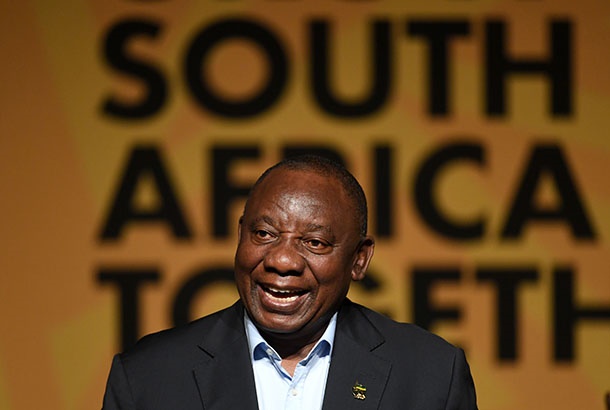
You don't have to be a lawyer to analyse the Public Protector's Bosasa report.
With just a tiny bit of logic, even the most politically uninformed person will be able to reach the conclusion that there are fundamental mistakes in her report. My legal friends and family tell me that there are a number of legal errors too, but I will leave these points to the courts to decide upon. However, it is very clear to me that the Public Protector does not understand the political system and the workings of Parliament, which is a bit of a problem given that this is a major part of her job.
Let's just remind ourselves that the president's answer to the Bosasa question in Parliament was in response to a follow-up or supplementary question by DA leader Mmusi Maimane. The original question was in relation to VBS, so the Bosasa question was not submitted to Ramaphosa beforehand as some analysts have been saying in the media.
The Public Protector questions why the president chose to respond to this follow-up question since the rules of Parliament clearly state that a supplementary question has to relate directly to the original question.
This is a fair point, but it often happens. The fact that President Ramaphosa did not need to answer the question doesn't mean he shouldn't have answered it. We have had nine years of constant avoidance of difficult questions under President Zuma. From the beginning of his presidency, Ramaphosa has been different. He has been open and willing to answer questions.
In his response during the Public Protector's investigation, the president stated that he had heard about his son's contract with Bosasa two months earlier and had assumed that was what Maimane's question referred to. It was only after he left the chamber that one of his campaign managers informed him that it related to CR17 campaign funding. After investigating the matter, he paid the money back and then wrote to the speaker to set the record straight.
The Public Protector accepts that Ramaphosa acted in good faith, but says that since the rules of Parliament don't explicitly provide for such a written apology (and since he "admitted" in his reply that he had made a mistake), he had de facto misled Parliament.
It seems to me that there is a contradiction here. On the one hand, Mkhwebane agrees that he acted in good faith, yet on the other, she insists that he deliberately misled Parliament. Would she have preferred that he kept quiet after realising the mistake? She can't have it both ways.
In her finding, she also instructs Parliament to change the rules to presumable explicitly provide for written corrections by members of Cabinet. My guess is that the reason for it not being a rule is that a situation should not be created where such a provision becomes a loophole for ministers to lie to Parliament, and then on the odd occasion when they are caught, simply have the option to correct it through a letter.
Although it does happen occasionally that ministers write to Parliament and correct a reply, it is still rare and not a way of avoiding the truth.
Mkhwebane then raises the issue of personal benefit to the president and his family. After looking at bank accounts and contracts, etc. it seems that the Public Protector has no concerns around Andile Ramaphosa's involvement with Bosasa.
However, she argues that by becoming president, Ramaphosa did benefit from the campaign and thus was under an obligation to declare every single donor to his campaign. This seems totally bizarre to me.
Firstly, if that argument holds true it would mean that the leaders of the various political parties and most MPs should declare all their political parties' funding as part of their personal declarations of interest. They all knew that they were on the list and thus – by soliciting funding for their political party – they stood a chance of being elected to Parliament.
Furthermore, the CR17 donations were part of a party political campaign and not a matter of state. There is a distinction in our legislation between party political funding and personal declarations of interest. In America for example, political candidates (including the president), are directly elected. Thus, any political funding for their campaigns has to be declared since it goes to the individual directly. However, this is not the case in our system.
The CR, NDZ, Sisulu, etc. campaigns were about electing the president of the ANC, not the president of the country. It is no different from the DA electing Maimane or the EFF Julius Malema. Yes, the expectation was that whoever won the ANC presidency would become president of the country – but that was never guaranteed.
Despite this, Ramaphosa and the key CR17 fundraisers have under oath declared that he never knew who the donors were because they did not want anyone to think that they could claim favours afterward, should he win. By not disclosing the identity of the individual donors they were attempting to stay within the spirit of the legislation, i.e. to prevent elected officials from using their influence to corruptly benefit donors or benefactors.
Under point 5.3.20 of her report, the Public Protector says in relation to this issue, "Although I have been informed by the CR17 campaign managers that the deliberate concealment of the donors and the amounts donated by them from President Ramaphosa was to avoid creating a perception that his goodwill can be bought, the primary reason in my view, should have been any situation of capture of the president that might compromise his decision-making in the future."
Can someone please explain the difference between "buying goodwill" and "compromise his future decision making" and how by now naming them it would remedy matters?
The Public Protector further protests that Ramaphosa did address donor meetings. Of course he did, but they were big groups of potential donors and according to all involved, he never knew if indeed anyone donated following these meetings.
Mkhwebane finally raises questions of money laundering. Despite saying that it is outside her jurisdiction, it is clear that she believes there is an issue here. Surely if there were serious doubts this should have been handled by the Financial Intelligence Centre (FIC)? She provides little more than a flow chart as evidence on this serious issue, casting very serious suspicion on the president.
Ramaphosa is correct to take this matter on urgent review. If the Public Protector loses, Parliament should dismiss her. Monday's ruling by the Constitutional Court seems to confirm her incompetence. If she also erred in this report on something as serious as the president's integrity with potentially disastrous implications for the country, she has no right occupying a position that is meant to protect the rights of all citizens, even presidents, from abuse of power – including false accusations.
- Melanie Verwoerd is a former ANC MP and South African Ambassador to Ireland.
** Want to respond to the columnist? Send your letter or article to voices@news24.com with your name, profile picture, contact details and location. We encourage a diversity of voices and views in our readers' submissions and reserve the right not to publish any and all submissions received.
Disclaimer: News24 encourages freedom of speech and the expression of diverse views. The views of columnists published on News24 are therefore their own and do not necessarily represent the views of News24.




 Publications
Publications
 Partners
Partners






















